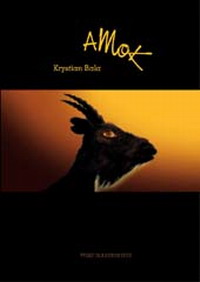Polish writer is under suspicion of murder
Fishermen dragged Dariusz Janiszewski's body from the cold waters of the Oder River in Poland in December 2000. His hands had been tied behind his back, with the rope connected to a noose around his neck.

Police struggled to find clues in the case - until a tip five years later led them to a novel that described an eerily similar murder and its author, Krystian Bala, who had suspected Janiszewski of having an affair with his estranged wife.
In Bala's 2003 sex-fueled book "Amok," the killer gets away with the crime. But on Wednesday, a regional court in Wroclaw sentenced Bala to 25 years in prison for planning and directing Janiszewski's murder.
Polish TV crews and journalists crowded the courtroom Wednesday for the ruling in the case, which has fueled intense interest largely because of Bala's novel, in which the narrator, "Chris," fatally stabs a woman named Mary after binding her hands behind her back and running the rope to a noose around her neck.
"The evidence gathered gives sufficient basis to say that Krystian Bala committed the crime of leading the killing of Dariusz Janiszewski," Judge Lidia Hojenska said. "He was the initiator of the murder; his role was leading and planning it."
Hojenska said it was not clear who actually killed Janiszewski or who might have aided Bala in the crime, but that the evidence overwhelmingly pointed to Bala's involvement in the events that led to Janiszewski's disappearance.
Dressed in a blue pinstriped sports coat, muted yellow tie and thin wire glasses, the 34-year-old Bala stood stone-faced between two policemen as Hojenska read the court's verdict. He showed no emotion, but occasionally glanced at his mother, who sat in the back of the courtroom.
Bala's family and lawyer said they planned to appeal the ruling. Bala has said he is innocent.
"Justice was served, but the verdict will never be adequate to the crime," said Janiszewski's father, Tadeusz, who often touched a photo of his son on the table in front of him. "It's tough to talk about being happy with it because nothing will bring my son back."
Janiszewski's body - stripped to a shirt and underwear - was fished from the Oder River on Dec. 10, 2000. His body showed signs of starvation and torture; his hands were bound behind his back and tied to a noose around his neck.
Police quickly identified the victim as Janiszewski, the owner of a local advertising agency who had disappeared four weeks earlier. But authorities struggled to find any clues, and dropped the case after six months.
Five years later, a tip led them to Bala's novel, and the similarities between the fictional and real-life murders. The shared traits aroused investigators' suspicions, although the parallels were not part of their case in court.
The judge said Bala was driven by jealousy to kill Janiszewski, whom Bala suspected of having an affair with his estranged wife. Prosecutors said Janiszewski and Bala's wife had become friends, and spent a night together in a Wroclaw hotel in the fall of 2000.
"He was pathologically jealous of his wife," the judge said of Bala. "He could not allow his estranged wife, whom he treated as property, to have ties with another man."
Hojenska said a host of circumstantial evidence led the court to its verdict.
While Bala maintained he had never met or talked to Janiszewski, police had tracked down a phone card used to make calls from a public phone to Janiszewski's office and then to his cell phone the morning he disappeared.
Calls were made the same day using the same card to Bala's girlfriend and his parents.
Prosecutors also said that someone using Bala's account on an Internet auction site sold Janiszewski's cell phone four days after his disappearance. Bala could not explain that.
In 2003, a Polish TV show broadcast a segment on Janiszewski's murder. Soon after the clip aired, the program's Web site dedicated to the case received hits from computers in Singapore, South Korea and Japan. Prosecutors say Bala was visiting those countries on those dates.
Then, during an April 2006 session with prosecutors, Bala confessed to killing Janiszewski, only to immediately retract his statement and suffer a fainting spell. A doctor was called in and declared there was nothing physically wrong with Bala. Since then, the author has not spoken to prosecutors.
The court also noted that a psychological assessment found Bala had "sadistic tendencies" and a need to demonstrate superiority. Experts said the narrator-killer in his book bears a psychological resemblance to Bala, who acknowledged using the name "Chris" when abroad and online.
"Amok" is a work of pulp fiction set in Paris and Mexico, narrated by a young translator who moves from one sexual conquest to another, killing one of his lovers, Mary.
"There are certain similar characteristics between the book's narrator and the author - shared psychological characteristics, life experiences, studying philosophy, parties, travel," the judge said Wednesday, while noting there were also differences between the fictional and the actual crimes.
Subscribe to Pravda.Ru Telegram channel, Facebook, RSS!


